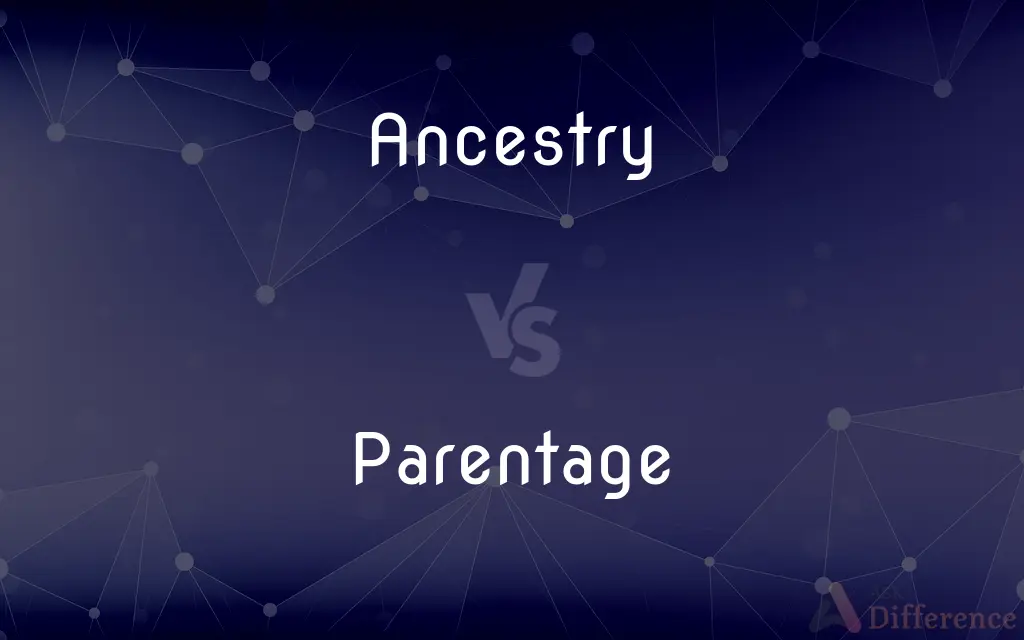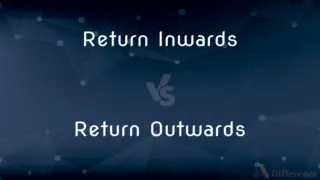Ancestry vs. Parentage — What's the Difference?
"Ancestry" refers to one's family lineage or genealogical descent. "Parentage" specifically refers to one's immediate biological or adoptive parents.

Difference Between Ancestry and Parentage
Table of Contents
ADVERTISEMENT
Key Differences
Ancestry predominantly refers to the lineage, or line of descent, traced continuously from an ancestor. It provides a broad perspective on one's family history, encompassing several generations and involving the study of family origins and history. It deals with the general background from which an individual comes, often examined through genealogical research to establish familial connections and heritage. Parentage, on the other hand, refers more specifically to the immediate biological or adoptive parents of an individual. It identifies the individual or individuals directly responsible for giving birth or raising a child.
In considering ancestry, people often explore their genealogical tree, discovering forebears and possibly uncovering ethnic and geographical origins, familial traits, or inherited characteristics. This exploration can extend back several generations, providing insight into familial migrations, settlements, occupations, and lifestyles. Parentage, conversely, does not usually involve such extensive exploration. It generally pertains to the identification of one’s immediate progenitors and may include legal considerations, especially in cases involving adoption, surrogacy, or disputes.
The term ancestry might also relate to ethnicity and heritage, providing a richer, more detailed overview of one's familial background and cultural origins. People might identify with their ancestry for cultural, social, or personal reasons, embracing the traditions, values, and history of their forebears. Parentage, however, is more concerned with the immediate familial unit and the legal and biological relationships therein. It primarily determines the identity of one’s mother and father, without extending into broader familial and cultural heritage.
In legal contexts, parentage often has significant implications, determining legal guardianship, inheritance rights, and responsibilities for child support and care. Establishing parentage is crucial in legal disputes involving custody, inheritance, and familial rights and obligations. Ancestry, in legal contexts, may not have such immediate implications but can be crucial in matters involving heritage, lineage rights, and entitlements.
Comparison Chart
Definition
One's family lineage or genealogical descent.
Specifically refers to one's immediate biological or adoptive parents.
ADVERTISEMENT
Scope
Broad, covering several generations and familial connections.
Narrow, focusing on immediate parents.
Relation to Heritage
Provides insights into cultural, ethnic, and familial heritage.
Primarily concerned with legal and biological relationships.
Legal Implications
Relevant in matters of heritage and lineage rights.
Crucial for determining legal guardianship and inheritance.
Exploration Depth
Involves extensive exploration of family history.
Generally limited to identifying immediate progenitors.
Compare with Definitions
Ancestry
Ancestry refers to the lineage or familial descent from ancestors.
John is proud of his Italian ancestry.
Parentage
It is crucial for determining legal guardianship, rights, and responsibilities.
Establishing parentage is essential in child custody cases.
Ancestry
It explores the genealogical tree, uncovering forebears and familial connections.
Ancestry research revealed connections to notable historical figures.
Parentage
Parentage denotes the identity of one's biological or adoptive parents.
The child wanted to know more about his biological parentage.
Ancestry
It is often associated with the study of family history and heritage.
Many people use ancestry websites to discover more about their heritage.
Parentage
Parentage concerns the legal and biological relationships between parents and child.
Disputes over parentage required legal intervention.
Ancestry
It denotes one’s family or ethnic background, heritage, and lineage.
She researched her ancestry to understand her family’s migrations.
Parentage
It refers to the state of being a parent.
The pup was of mixed parentage, showing traits of different breeds.
Ancestry
Ancestry provides insights into familial traits, histories, and origins.
His ancestry dates back to the early settlers in the region.
Parentage
Parentage primarily establishes familial relationships and inheritance rights.
The inheritance was divided according to legal parentage.
Ancestry
Ancestral descent or lineage.
Parentage
Descent from parents; lineage
Of humble parentage.
Ancestry
Ancestors considered as a group.
Parentage
The state or relationship of being a parent.
Ancestry
Condition as to ancestors; ancestral lineage; hence, birth or honorable descent.
Title and ancestry render a good man more illustrious, but an ill one more contemptible. -Addison.
Parentage
Derivation from a source; origin.
Ancestry
A series of ancestors or progenitors; lineage, or those who compose the line of natural descent.
Parentage
The identity and nature of one's parents, and in particular, the legitimacy of one's birth.
Ancestry
Condition as to ancestors; ancestral lineage; hence, birth or honorable descent.
Title and ancestry render a good man more illustrious, but an ill one more contemptible.
Parentage
The social quality of one's class in society.
Ancestry
A series of ancestors or progenitors; lineage, or those who compose the line of natural descent.
Parentage
(figurative) Origin; derivation.
Ancestry
The descendants of one individual;
His entire lineage has been warriors
Parentage
Descent from parents or ancestors; parents or ancestors considered with respect to their rank or character; extraction; birth; as, a man of noble parentage.
Though men esteem thee low of parentage.
Ancestry
Inherited properties shared with others of your bloodline
Parentage
The state of being a parent;
To everyone's surprise, parenthood reformed the man
Parentage
The kinship relation of an offspring to the parents
Parentage
The descendants of one individual;
His entire lineage has been warriors
Common Curiosities
Is ancestry only concerned with blood relations?
Ancestry primarily involves blood relations but can also include consideration of adoptive and marital ties in familial history.
Does parentage always refer to biological parents?
No, parentage can refer to both biological and adoptive parents.
Can ancestry be explored through DNA testing?
Yes, DNA testing is a common method used to explore one’s ancestry and familial connections.
Is legal parentage always the same as biological parentage?
No, legal parentage may differ from biological parentage, especially in cases involving adoption or surrogacy.
Can ancestry have implications for inherited health conditions?
Yes, understanding one’s ancestry can provide insights into familial health patterns and inherited conditions.
Can ancestry provide information about ethnic origins?
Yes, exploring ancestry can reveal information about one’s ethnic and cultural origins.
Does establishing parentage impact child support obligations?
Yes, establishing parentage is crucial in determining legal responsibilities, including child support obligations.
Share Your Discovery

Previous Comparison
Return Inwards vs. Return Outwards
Next Comparison
Common Stock vs. Treasury Stock










































